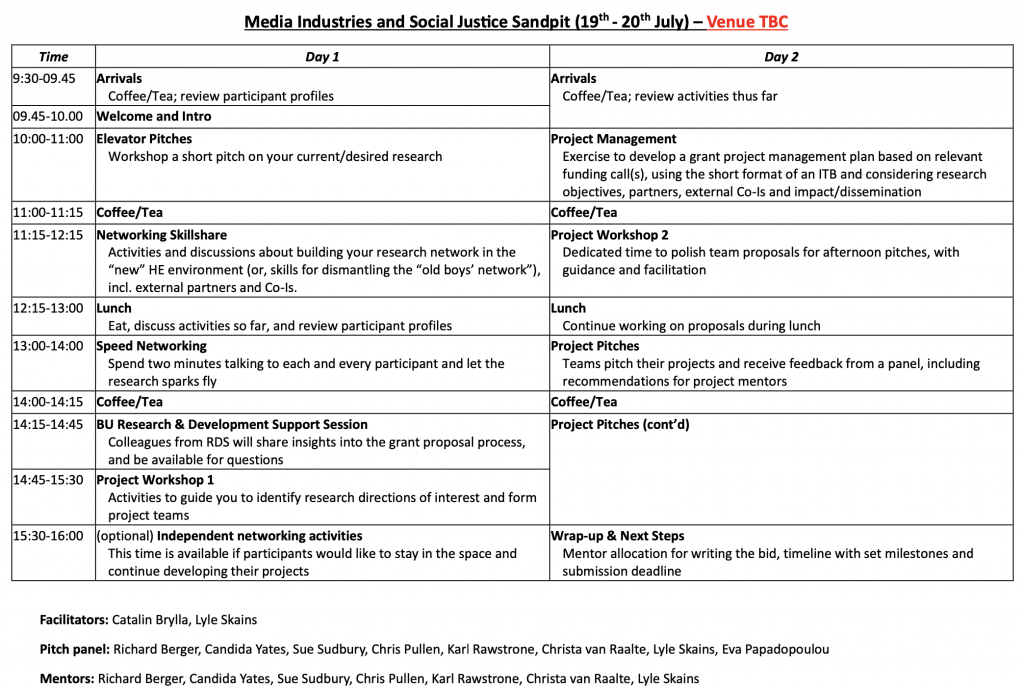Apply to participate here! More details below.
Media Industries and Social Justice Sandpit
Co-organised by the Media Production department and CESJ (the Centre for the Study of Conflict, Emotion and Social Justice).
19th and 20th July, 2023 (venue TBC)
This two-day sandpit creates a dynamic approach to the development of concepts for innovative projects and funding bids. By the end of both days, the participants will form interdisciplinary project teams and generate proposals (including pinpointing external partners) for funded projects on media and social justice issues. See more details in the programme outline.
The event will involve participants from across BU, who are interested in, or already doing research on, social justice issues. It will establish an interdisciplinary dialogue, enhance the scope for public engagement or knowledge transfer, increase the potential for impact, improve the chances for successful bids, and establish cross-institutional networks as seedbeds for future projects.
The sandpit will culminate in project pitches to a panel of senior staff (see below) for constructive feedback and for allocating a bid-writing mentor. After the event, the teams will be offered mentorship to support writing the full funding application.
Who should participate:
We welcome any BU-based junior to mid-career researcher, artist, practitioner or anyone with a general interest in media and social justice. You should be keen to work in a multidisciplinary team, and willing to commit to attending the full sandpit, on both days. No prior experience of research funding is required.
How to participate:
To secure your spot in the Sandpit, please complete and submit the following application – note that all participants must commit to attending both full days:
APPLY HERE BY 23rd JUNE: https://forms.office.com/r/Ezix4LkcL0
The event will be facilitated by Dr. Catalin Brylla and Dr. Lyle Skains, and the pitching panel and mentors will include Prof. Richard Berger, Prof. Candida Yates, Prof. Christa van Raalte, Dr. Sue Sudbury, Dr. Christopher Pullen, and Dr. Karl Rawstrone.
If you have any queries, please don’t hesitate to contact Catalin at cbrylla@bournemouth.ac.uk, or Lyle at lskains@bournemouth.ac.uk.


 The role and social importance of TV and film during this pandemic has been much commented on. But how healthy is this industry? The good news is that this sector has been expanding at more than three times the rate of the wider economy, generating an annual trade surplus of almost £1 billion. The less good news is that this expansion has been at the expense of its most valuable resource – its skilled workforce. The preliminary report from our State of Play survey, undertaken shortly
The role and social importance of TV and film during this pandemic has been much commented on. But how healthy is this industry? The good news is that this sector has been expanding at more than three times the rate of the wider economy, generating an annual trade surplus of almost £1 billion. The less good news is that this expansion has been at the expense of its most valuable resource – its skilled workforce. The preliminary report from our State of Play survey, undertaken shortly  This week sees the launch of
This week sees the launch of 










 Dr. Ashraf cited on ‘Modest Fashion’ in The Guardian
Dr. Ashraf cited on ‘Modest Fashion’ in The Guardian NIHR-funded research launches website
NIHR-funded research launches website Academics write for newspaper in Nepal
Academics write for newspaper in Nepal New paper published on disability in women & girls
New paper published on disability in women & girls Global Consortium for Public Health Research 2025
Global Consortium for Public Health Research 2025 MSCA Postdoctoral Fellowships 2025 Call
MSCA Postdoctoral Fellowships 2025 Call ERC Advanced Grant 2025 Webinar
ERC Advanced Grant 2025 Webinar Horizon Europe Work Programme 2025 Published
Horizon Europe Work Programme 2025 Published Horizon Europe 2025 Work Programme pre-Published
Horizon Europe 2025 Work Programme pre-Published Update on UKRO services
Update on UKRO services European research project exploring use of ‘virtual twins’ to better manage metabolic associated fatty liver disease
European research project exploring use of ‘virtual twins’ to better manage metabolic associated fatty liver disease